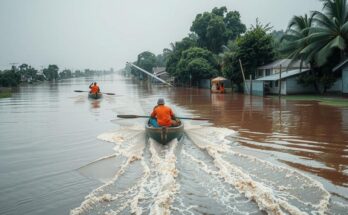Switzerland’s climate finance contributions are under scrutiny, with some studies suggesting the country exceeds its fair share while environmental groups argue otherwise. The ongoing COP29 discussions highlight the necessity for developed nations to provide adequate funding to developing countries facing the climate crisis. Calls for Switzerland to increase its climate aid significantly reflect broader international expectations as financial obligations come to the forefront.
The debate surrounding Switzerland’s climate finance contributions is intensifying, particularly with climate funding for developing nations taking center stage at COP29 in Azerbaijan. According to a study by the Overseas Development Institute (ODI), Switzerland is perceived to have exceeded its ‘fair share’ of contributions, donating approximately CHF 1.16 billion in 2022, compared to an estimated fair share of CHF 814 million. This contrasts with sentiments from various environmental organizations such as Greenpeace and Alliance Sud, which argue that Switzerland’s contributions remain insufficient given its economic capacity and historical emissions.
Set against the Paris Agreement’s framework, where countries voluntarily determine their financial contributions, the concept of ‘fair share’ is primarily derived from historical responsibility for emissions and economic capability. While Switzerland, along with other countries like Norway and France, has been recognized as a generous contributor, critics highlight that many advanced economies, including the United States and Greece, fall short of meeting their responsibilities.
Notably, much of the climate financing is delivered in the form of loans rather than grants, contributing to increasing debt levels among recipient nations. This has led to calls for a more equitable approach rooted in the principle that polluters should shoulder the financial burden of climate change. Advocacy groups urge Switzerland to double its financial aid to at least CHF 1 billion annually, reflecting a more accurate assessment of its global carbon footprint. As global negotiations progress, the push for developed nations to significantly enhance their fiscal support for climate adaptation in developing countries remains a contentious and pressing issue.
With the upcoming COP29 focusing on long-term climate financing, the expectation is that Switzerland’s contributions will need to expand significantly to align with calls from developing nations and NGOs for increased support, hinting at an imminent recalibration of financial commitments both globally and within Switzerland itself.
Switzerland’s financial commitments towards climate adaptation for developing countries are crucial amidst ongoing global climate crisis discussions. The Paris Agreement establishes the framework within which countries determine their contributions, emphasizing historical emissions and economic capacity. Current financial needs are vast, highlighted by calls for a collective funding goal raise from $100 billion to at least $1 trillion annually to further support vulnerable nations. In this context, Switzerland’s role and obligations under international climate finance become critical points of analysis and contention.
In essence, Switzerland’s current contributions to climate finance are subject to debate, particularly regarding whether they suffice relative to its economic standing and historical emissions. As Switzerland prepares for COP29, pressure is mounting from environmental groups and developing nations alike for increased financial support. The alignment of Switzerland’s contributions with both its fair share and the greater international expectations will be pivotal in shaping its climate finance strategy moving forward.
Original Source: www.swissinfo.ch




